
The penultimate entry in my series of strategy posts about Brave New World's new civilizations will focus on the very unique civilization of Venice: the playable City-State.
The city of Venice is one of the most architecturally astounding cities in the world. It is built on top of 118 small islands in the marshy Venetian lagoon. These natural and artificial islands are separated by a network of canals that run through the city and act almost like a network of roads. Many of the buildings and paved surface roads and walkways are built on top of stilts that emerge from these shallow canals and the city contains over 400 bridges. Historically, most of Venice's traffic has been through the waterways (via gondole) or on foot, but the modern city does have a contemporary road network (although a very compact one) intended for automobiles. Due to its unique environment and construction, the city is an astounding work of engineering art in and of itself.
There are no surviving historical records depicting the founding of Venice, but historians believe that the islands were originally settled by refugees from Roman cities during the Germanic and Hunnic invasions between 400 and 600 C.E. Venice began to expand its international influence prior to the thirteenth century by battling pirates that were plaguing trade in the Adriatic and Mediterranean. The City-State began to become an influential economic force in the region due to its position as a hub for trade between Europe and the Middle East, and Venice non-violently acquired control over many islands of the Aegean, including Cyprus and Crete. Failed military actions and the devastation of the black plague in the fifteenth century lead to the decline of the Venetian empire, and Venice was eventually conquered by Napoleon, then surrendered to Austria in the terms of a peace treaty, then conquered again by Italy during its war of independence. Fortunately, Venice was spared from attack during World War II, and so much of its historical architecture has remained intact, making it a popular tourist destination today.
The 42nd Doge of Venice, Enrico Dandolo is known mostly for his blindness. There are conflicting stories regarding how Dandolo became blind. The decreasing legibility of his signature between 1174 and 1176 implies that he became blind gradually, possibly due to an injury sustained in Constantinople. He was also a very pious leader who provided invaluable assistance to the knights of the Fourth Crusade and played an integral part in the eventual sacking of Constantinople. Despite his blindness, Dandolo survived into extreme old age, being almost a hundred years old (by some estimates) at the time of his death in 1205. He was buried in the Hagia Sophia in Constantinople, but his original tomb was destroyed by the Ottomans when they captured Constantinople (renamed it Istanbul) and converted the Hagia Sophia into a mosque.
Venice was a City-State in Gods & Kings but was promoted to a full civilization for Brave New World. Venice doesn't expand like a traditional civ in Brave New World; instead, it buys control of fellow City-States or expands its influence via conquest, both of which are funded by its excessive trade routes.
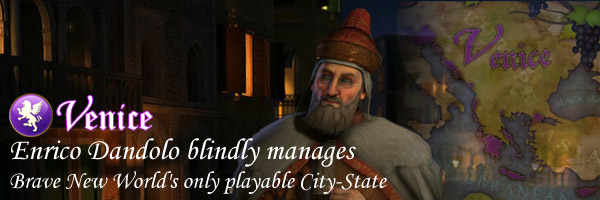
Venetian uniques in Civilization V: Brave New World

Venice is one of the most novel and interesting concepts in Brave New World. Essentially, this civilization acts as a playable City-State that uses its vast amounts of wealth to buy infrastructure (including new cities) and to manipulate the world stage. Players who have played the "one-city-challenge" will likely feel pretty comfortable with Venice.
Serenissima
"Cannot gain settlers nor annex cities. Double the normal number of trade routes available. A Merchant of Venice appears after researching Optics. May purchase in puppeted cities."

Enrico Dandolo is prohibited from building or buying Settlers, which means that Venice cannot found their own cities (except for the Capital). Further, if another player in multiplayer gives Venice a Settler or Conquistador (can also come from militaristic City-State ally), then these units will not have the ability to found a city.
Instead of settling new cities, the Venetian trade empire must rely on military conquest, trade deals, and its unique Merchant of Venice in order to expand its influence. Puppeted cities will prioritize assigning merchant specialists and there are several opportunities for free Merchants of Venice, so Venice will have plenty of opportunity to generate Merchants of Venice to peacefully acquire City-States.
A free Merchant of Venice is awarded upon researching Optics (and does not increase the cost of the next one). Another can be obtained from Liberty's Collective Rule policy (instead of a settler), and yet another can be chosen by finishing Liberty, but both of these increase the Great Person Point cost of the next one. They can also be purchased with faith after completing the Commerce tree or via the "To the Glory of God" reformation belief. Additional Merchants of Venice can be obtained by regular merchant Great Person Points or by any other mechanic that allows Venice to chose a free great person.
Serenissima also doubles all sources of trade routes. Each time Venice researches a technology that grants an extra trade routes, Venice will receive 2 new trade routes instead. This also includes wonders: Colossus and Petra will each grant two additional routes for Venice. Venice can use the massive amounts of wealth that it generates (from double trade routes and via Merchants of Venice) to purchase buildings and units in its cities (including in puppets). They can use this to improve city infrastructure and to quickly create a military for defense or conquest. Having double trade routes also gives Venice much more leeway ship food and production between its own cities.
The biggest hindrance of Serenissima is that Venice is incapable of placing cities where it wants them. Even if you raze an enemy [non-Capital] city in an undesirable location, you still can't resettle in a more advantageous spot. This brings to light another serious limitation: despite Venice having the ability to "purchase in puppeted cities", they can only purchase units and buildings with Gold or Faith, and may not purchase tiles in puppet cities.
Don't lose the Capital!
If Venice loses its original Capital, the Capital is moved to another puppeted city. Because Serenissima prevents city annexing, the new Capital is NOT annexed and is still a puppet. No wonders or archaeologists may be built in any city at this point, since all cities will be puppets.
It is also worth noting that there is currently a bug (or "feature" of Serenissima) in the game that prevents Venice from annexing its own Capital if they recapture it by force during a war. If this happens, the player is only given the option to puppet the city.
The auto-annex glitch does provide a loophole for Venice to annex cities: if Venice acquires a city through a trade deal on another player's turn, it may be auto-annexed. Since this is a bug, I did not factor it into my strategies. If you lose your Capital in an MP game and are in a position to recapture it, you can maybe convince the other player (in the interests of fair play) to sell it back to you in order to nullify the capital-puppeting glitch above.
Merchant of Venice

Game Info: "This Venetian unique Great Person replaces the Great Merchant. Aside from the ability to Conduct a Trade Mission, the Merchant of Venice can purchase City-States outright, bringing them under Venetian control as a Puppet."
Civilopedia Strategy: "The Merchant of Venice is a unique Great Merchant replacement. Aside from the normal Great Merchant abilities, the Merchant of Venice can acquire a City-State outright, bringing it under Venetian control as a puppet. The Merchant of Venice is expended when used in this way."
Replaces: Great Merchant.
Requirements: none (same as Great Merchant).
Cost: variable GPP.
Type: Civilian, Great Person.
Movement Speed: 2
Abilities: Can be expended to create a Customs House tile improvement or conduct a Trade Mission with a City-State (same as Great Merchant).
Can be expended to purchase a City-State, adding it to the Venetian Empire.
Bonuses: Trade Mission Bonus promotion: +100% more Gold and +100% more city-state influence than a normal Trade Mission.
 The major difference between the Merchant of Venice and a regular Great Merchant is the ability to use the Merchant's "considerable" wealth to purchase a City-State which becomes a puppet in your empire. Also, the Merchant of Venice receives double influence (60 influence instead of 30 on standard settings) and double gold from a trade mission thanks to it's Trade Mission Bonus promotion. The gold bonus is cumulative with Commerce's Entrepreneurship social policy, granting 4x the gold in total!
The major difference between the Merchant of Venice and a regular Great Merchant is the ability to use the Merchant's "considerable" wealth to purchase a City-State which becomes a puppet in your empire. Also, the Merchant of Venice receives double influence (60 influence instead of 30 on standard settings) and double gold from a trade mission thanks to it's Trade Mission Bonus promotion. The gold bonus is cumulative with Commerce's Entrepreneurship social policy, granting 4x the gold in total!
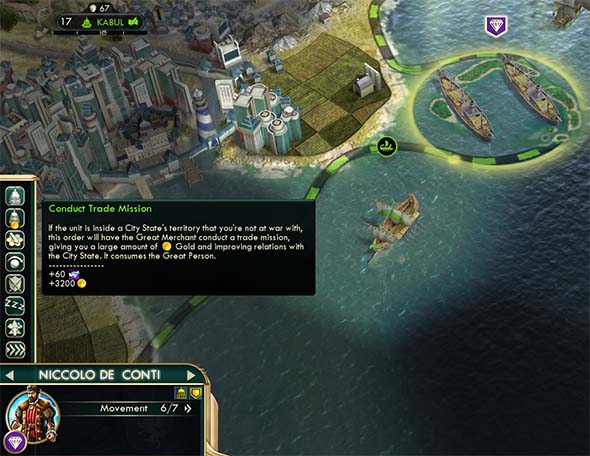
Merchants of Venice aren't just for buying City-States. They also generate bonus gold and influence!
I generally don't bother using Merchants of Venice to plop Customs Houses, since that seems like a waste of this unique unit. Venetian Customs Houses aren't any better than regular Customs Houses, and your double trade routes should provide more than enough gold per turn in most cases. Instead, I prefer to perform trade missions in City-States to take advantage of the double influence and gold, if I'm not buying the CS outright.
|
Trade Mission Gold |
|---|
| Era | Standard
Great Merchant | Merchant of Venice (x2) | MoV &
Entrepreneurship (x4) |
|---|
| Ancient | 300 | 600 | N/A* |
| Classical | 400 | 800 | N/A* |
| Medieval | 500 | 1000 | 2000 |
| Renaissance | 600 | 1200 | 2400 |
| Industrial | 700 | 1400 | 2800 |
| Modern | 800 | 1600 | 3200 |
| Atomic | 900 | 1800 | 3600 |
| Information | 1000 | 2000 | 4000 |
*The Commerce Social Policy tree is not available until the Medieval era.
In it for the money; not the love
Similar to Austria's "Diplomatic Marriage", Venice can peacefully absorb City-States that it is not at war with into its empire, acquiring the city (and any other cities that the CS has conquered), its territory, its population, and all units that the City-State controls. Unlike marriages with Maria Theresa, City-States purchased by Venice do not require a gold bribe, do not need to be allies, and they cannot be annexed. So Venice does not need to focus on diplomatic relations with City-States in order to acquire them, and can focus on the Honor, Aesthetics, and/or Commerce policy trees instead of Patronage. These cities cannot be liberated back to their original owner in any way! They only generate the normal 3 unhappiness per city (on standard map size and game speed), and they do receive the free buildings from Tradition social policies, and they receive the happiness benefits of any wonder, policy, or ideology that affects "non-occupied" cities.
-
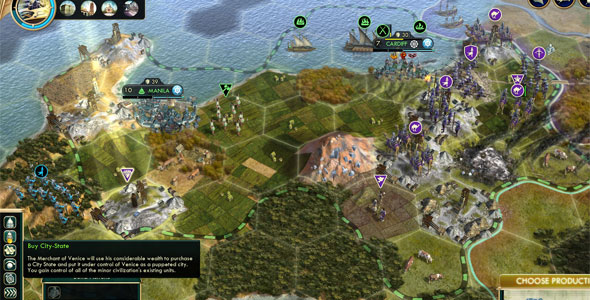
1.) The CS, Manila, just captured Cardiff.
-
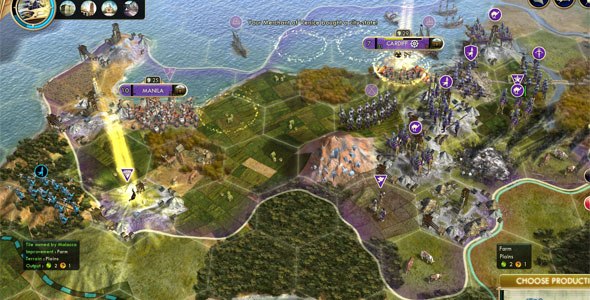
2.) Purchasing Manila includes Cardiff for a "Buy 1, Get 1 Free" deal.
Venice gains all cities that are under a CS's control when it purchases a CS with a Merchant of Venice.
Unlike military units gifted by a City-State, the units that you gain when you buy a City-State with a Merchant of Venice do not retain any promotions or experience that they originally had. From what I can tell, the game deletes the City-State's units and then spawns new, stock units belonging to Venice near the purchased city. This is regardless of whether the city has Barracks. Keep this in mind if you plan to purchase a City-State in order to boost your own military strength, and be wary of giving promoted units as gifts to City-States that you may eventually purchase!
As far as I can tell, buying a City-State will not have diplomatic consequences with any allies or protectors of that City-State. If anybody has examples of A.I.s becoming upset by this, please post a comment (and maybe provide a screenshot). Using a trade mission, however, to become insta-allies can cause other civs to dislike you for "Competing for the favor of the same City-States".
This does not mean that purchasing City-States is entirely safe, however. Purchasing a City-State near a non-friendly civ will often count as "rapid expansion", and A.I.s may denounce you following the purchase. Make sure that you can defend your newly-acquired City-States if you're going to purchase ones near aggressive civs like Zulu, Japan, Assyria, Huns, and so on. Be sure to have a surplus of gold in your coffers so that you can use your trait to purchase units and defensive buildings if necessary.
The porcelain or jewelry luxury from mercantile City-States disappears if you buy the CS with a Merchant of Venice.
Also, be wary of buying City-States that you are friends or allies with, since you'll lose the free bonuses that they give you. Instead, focus first on buying City-States with whom it is impractical to become allies with. Finally: think carefully about purchasing mercantile City-States, since purchasing the CS causes the underlying unique luxury (porcelain or jewelry) to disappear permanently.
Great Galleass
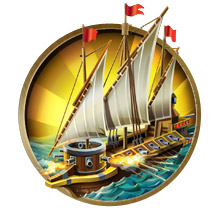
Game Info: "A brutally powerful Medieval Era Naval Unit used to wrest control of the seas with its ranged attack. Better at attacking and defending than the normal Galleass it replaces, but more expensive. May only be built by Venice."
Civilopedia Strategy: "The Great Galleass is the Galleass replacement, and only the Venetians may build it. Has a stronger ranged attack, is more resilient in battle, and is more costly than the base Galleass."
Replaces: Galleass.
Requirements: Compass technology and 1 gold per turn maintenance (same as Galleass).
Obsoleted: Navigation technology (same as Galleass).
Cost: 110 Production (+10 from Galleass) / 430 Gold (+30 from Galleass) [Standard speed].
Attack Type: Ranged, Combat Class: Naval Ranged,
Combat Strength: 18 (+2 from Galleass),
Range: 2 (same as Galleass), Ranged Strength: 20 (+3 from Galleass).
Movement Speed: 3 (same as Galleass).
Penalties: May not melee attack; Cannot enter deep ocean (same as Galleass).
The Great Galleass has higher base strength (both ranged and melee defense) and is more expensive than the Galleass that it replaces. Since it does not have any special promotions, there is nothing that carries over to Frigates.
This unit can rip through Triremes and Caravels like butter, and it's not dependent on any resource to build. It would be a potent mid-game naval unit if you could ever get enough of them to the front lines to ever use them. They are just as slow as the Galleass (slower than Triremes), are confined to coastal tiles, and are more expensive to build and buy. All of this, and the fact that Venetian territory is often spread out over the map, combines to make it very difficult to get the Great Galleass anywhere useful. This limitation is compounded on larger maps and/or quick game speeds, since by the time the Great Galleass gets into position, it will likely be obsolete.
With the Great Lighthouse and/or Exploration policy tree, this unit can become much more viable, especially after you promote it with Supply (allowing it to heal outside of friendly territory) and either extra range or mobility. Having an extra movement point will at least allow the Great Galleass to keep up with Cargo Ships so that it can act as an escort. Even then, it's not particularly helpful in naval assaults, since you still don't have a worthwhile melee naval unit until Privateers, and so can't capture coastal cities. At best, they're good coastal defense weapons (particularly against barbarians) and amphibious invasion support, but they don't rule the seas as England's Ship of the Line does.
Humble beginnings: Getting started with Venice
Venice's novel game mechanics add some unique challenges to the game, but also give Venice some unprecedented opportunities. Venice can still expand and conquer just like any other civ; they just do it a little bit differently than others.
Very early in the game, you may not feel as pressured to explore very far, so you can focus more on a Monument, Granary, and Library rather than popping out multiple Scouts. Pretty much the only things you'll be looking for with your Scout(s) are trade partners and ancient ruins. You don't have to worry about finding suitable locations to settle, since you can't settle new cities. Not being able to settle new cities also weakens some of the benefits of the Liberty social policy tree, so Tradition becomes a much more attractive starting tree. The free culture buildings and aqueducts from Tradition will also be given to your first three purchased City-States, so these policies are not wasted!
Not having to focus on settlers early does give Venice one big early-game advantage: you can feel free to focus more on military units or wonders in the early game!
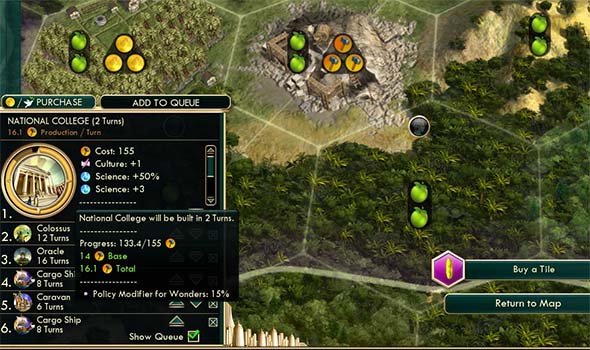
A typical early game Venetian build queue should contain lots of wonders and trade units.
With only a single city, national wonders will remain very cheap throughout the entire game, so you should focus on building those as soon as possible. The National College should be an early priority. You can then research Drama and Poetry to go for the National Epic and Writer's Guild, but I recommend you focus on Currency and Guilds in order to build Markets, Trade Posts, and the Artist's Guild first. The Aristocracy policy in Tradition will help speed up the construction of your national wonders, so be sure to adopt it prior to building your national wonders.
National wonders don't need to be your only focus, there are a few world wonders that are great for Venice as well. On higher difficulties, the ancient and classical wonders in this list should be higher priority than national wonders, since competition will be fierce:

- Colossus: Its effects are doubled by Serenissima, providing two trade routes instead of one (although you only get one free Cargo Ship). Having a coastal start bias and not having to train Settlers means that you can research Iron Working and start building Colossus while other civs are racing to found cities. In the Medieval Era, with Sailing, Animal Husbandry, Engineering, and the Colossus, Venice has already unlocked eight trade routes! Colossus will also start generating merchant points towards your first Merchant of Venice.

- Big Ben: since Venice is dependent on purchasing buildings and units in its cities, this wonder is a definite must-build. The 25% penalty to research in puppets may leave you a little behind in tech during the mid-game, so you may be late getting to the Industrialization party. If so, you can try keeping a Great Engineer hanging around if you produced one during the Renaissance so that you can rush this wonder. It also provides points towards future Merchants of Venice.

- Porcelain Tower: Venice will have a lot of disposable income in the later half of the game, which will mean it can easily afford multiple research agreements in order to offset the -25% science in puppets and remain competitive technologically (assuming you remain friendly with other civilizations). You must open the Rationalism tree in order to build this, and you should combine the Porcelain Tower with the Scientific Revolution policy. This wonder is less important if you plan a domination victory, since you might not have enough friends for it to be worthwhile.

- Hanging Gardens: Buffing the city of Venice is of paramount importance, and the increased growth from the Hanging Gardens will allow you to start assigning specialists sooner. Additionally, if you don't start out next to a river or lake, then the free Garden provided by this wonder becomes immensely useful, as it will speedup your generation of Merchants of Venice. Many A.I.s favor Tradition (which is a prereq for this wonder), and there is a lot of competition for this wonder on higher difficulties. If you focused on Iron Working, Optics, or Drama and Poetry first, instead of Mathematics, then you may not be able to acquire this wonder in time.

- Great Lighthouse: you'll be researching Optics early anyway in order to gain your first Merchant of Venice, so you might be able to sneak in the Great Lighthouse. Colossus should be higher priority, however, unless you have a lot of sea resources near your Capital and would benefit greatly from the effects of a Lighthouse. The Great Lighthouse will help make your Great Galleass much more useful later in the game, as well as providing an additional point towards future Merchants of Venice.
-
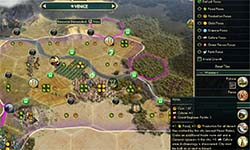
A rare non-coastal Venetian start: I moved my settler 2 tiles south west in order to be adjacent to desert and build Petra.
Petra: this wonder is also doubly effective for Venice, but Venice is highly unlikely to be able to build it due to a lack of a desert start bias and inability to settle near a desert or build the wonder in puppets that might be in desert. Your best chance at getting this wonder is to capture the city in which it is built.
I recommend using your first Merchant of Venice (from Optics) to buy a City-State. This will allow you to start shipping food or production back to your Capital and will give you some additional science and the capacity to buy more units. Try to get a nearby City-State if possible (preferably a coastal city, since sea routes will give you more food), but you can go further away if you have a particular strategic need. On higher difficulty levels, it might be a good idea to delay buying a City-State until the CS has grown larger and builds some units (since they will have buffs allowing them to grow and build more quickly).
The greatest threat to Venice early in the game is not having enough nearby cities to trade with. Oddly-shaped continents, impassable mountain ranges, and other environmental obstacles can easily limit Venice's actual trade route capacity. Since you can't found your own cities, it's a bit harder to extend the reach of your trade network. If this is the case, then you should prioritize researching Horseback Riding and building a Carivansary to put a few more cities in range of a trade route.
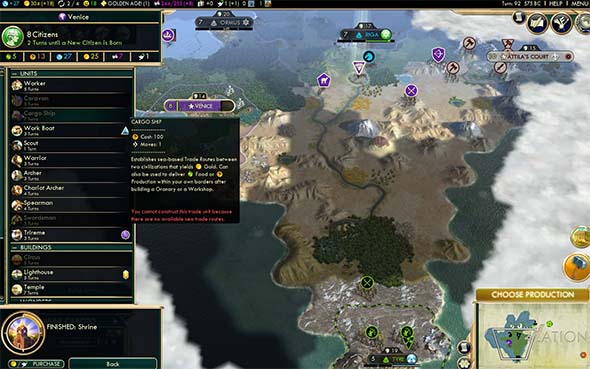
Some maps may place Venice too far from trade partners, in which case, you can buy a far-away CS that you can use as a trade hub.
If you are still too far away from worthwhile trade partners, you can use your free Merchant of Venice from Optics to buy a City-State that is in the middle of other City-States and civilizations. Send a military unit with your Merchant to protect it from barbarians. Once you have a trade hub, start sending routes to foreign cities for gold and beakers. Don't worry too much about spreading yourself out early in the game. With a handful of trade routes up and running (you should have at least six available by the medieval era), you'll likely be able to afford to buy units at a moment's notice to defend from hostile neighbors. It's not uncommon to be able to afford a new unit every 3 to 5 turns.
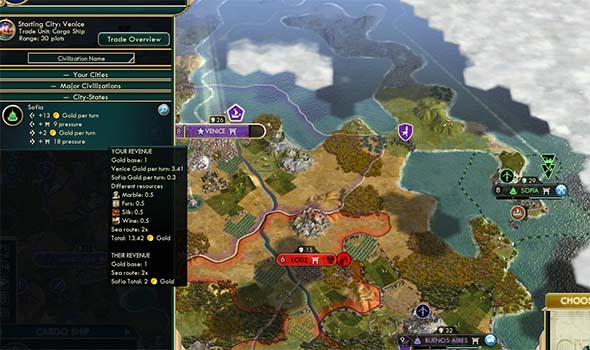
Not being able to settle new cities makes Venice dependent on other civs settling in places worth capturing or buying.
For example, a canal city on the tile with the Pikeman would spare my cargo ship from having to sail around the peninsula, and would grant access to other trade partners.
As you purchase new city states, you should send food and/or production to them so that they grow fast enough to provide decent research and assign specialists. You can plop great person improvements near them, but avoid placing academies near your puppets, since puppets have a -25% science penalty. Puppets will usually focus on gold-generating buildings first. Since you should have a large amount of income from your trade routes, you should be in no hurry to rush these buildings; let the puppet build gold buildings at their own pace. Spend your money on cultural buildings and science buildings in new puppets in order to start generating those yields sooner and make up for their inherent weaknesses.
Be sure to send food and production back to your capital. I always had every puppet sending a trade route back to Venice. Most of them were food, but I also sent a couple production routes in order to keep myself competitive for mid and late-game wonders.
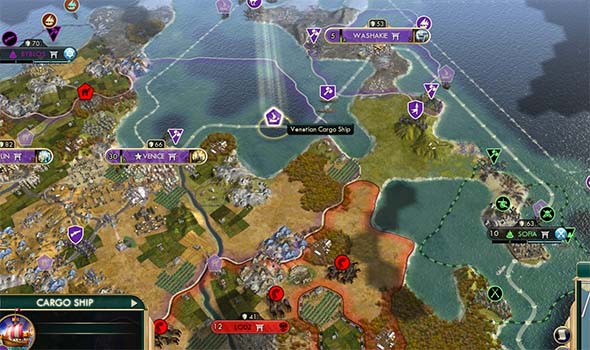
Purchasing another civ's canal city shortened the length of some trade routes and granted access to further cities.
The focus of your military early in the game should be on escorting trade units and dispersing barbarian encampments. Not settling your own cities will leave a lot of terrain in the fog of war, which will allow barbarians to spawn until another civilization starts to fill in the region with its own cities. Adopting Honor will give you a heads up whenever a new encampment spawns, and will grant a combat bonus against barbarians. If you have sufficient escorts, then you won't need Honor, but it's not a bad option. Killing barbarians can also be a good source of early-game influence with City-States.
You can use the money from your extra trade routes to start manipulating the world stage. Not settling new cities means you are less likely to anger other civs, and it's generally easier to get declarations of friendships and defensive pacts. But even if you can't make friends, you can afford to pay more in trade deals if necessary, can bribe other civs into war or peace, and may even have enough disposable income to trade for other players' cities if they are in desirable circumstances.
When the world congress gets founded, you should avoid proposing or voting for the competitive projects (World's Fair, International Games, International Space Station). With only one city, it will be very difficult for you to compete with other civs for the top awards. If you're lucky, your puppets will decide to help, but you can't rely on them, and you can't "purchase" production towards a project.
The prosperity gospel
Venice can't settle new faith-generating natural wonders or near terrain and resources that will be buffed by a pantheon (or Monasteries). However, Venetian puppets will build religious buildings whether you want them or not, so you will always have some faith income. Religion can provide powerful benefits to a civilization that are independent of the civilization size, and which can contribute to any victory condition. Having only one city also means that your Grand Temple will be very cheap and easy to build.
Your pantheon choice needs to take into account the fact that you can't settle new cities. If there are nearby City-States that have particular terrain and/or resources, then you can consider taking a pantheon that buffs their terrain in anticipation of eventually absorbing them. Monuments of the Gods (+15% production towards ancient and classical wonders) is also worthwhile since Venice can spend time building early wonders instead of Settlers. Other pantheons that provide static benefits can also be worthwhile, such as God King (+1 Culture, Faith, Gold, Production, and Science in Palace).
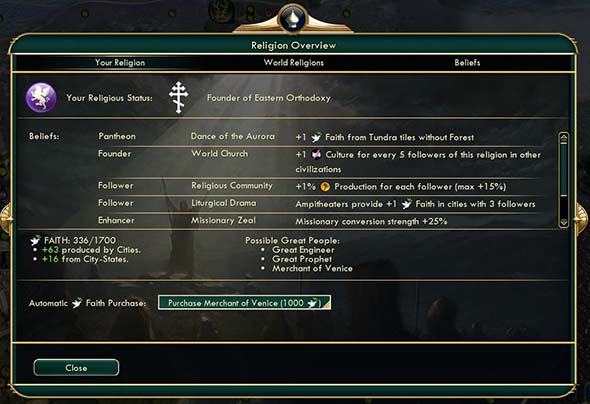
Finishing Commerce or adopting To the Glory of God reformation belief will allow Venice to purchase Merchants of Venice with faith.
Once you upgrade to a religion, be wary of Interfaith Dialogue or any belief that requires you to aggressively use Missionaries. You don't want to risk angering your trade partners with relentless proselytizing. Instead, use trade routes to passively spread your religion to foreign cities. Send multiple routes to cities belonging to the same civ to quickly convert them (especially effective with civs that do not already have a strong religious presence in their cities). Missionaries should be dedicated to spreading your religion to City-States (to fulfill quests), and excess faith should be used to buy buildings and great people. Tithe and Initiation Rites aren't particularly valuable due to Venice's already-strong economy, and Papal Primacy isn't very valuable considering the double influence and gold from trade missions with Merchants of Venice. World Church can be a good founder belief, as it doesn't require a majority in any cities and since culture output is usually one of Venice's weaknesses. Unity of the Prophets makes a good reformation choice, since it will help you maintain your religion in foreign cities.
Don't forget that Venice is unique in that it can purchase religious buildings in puppets!. Faith output in puppets is not nerfed in the same way that science and culture is, so Venice is uniquely positioned to control a formidably pious puppet empire!
You should definitely prioritize finishing Commerce as soon as you can (maybe even delaying finishing Piety if you must). This will allow you to start using your faith to purchase Merchants of Venice, which does not increase the cost of your naturally-occurring Merchants of Venice from your cities.
Buying success: winning with Venice
Due to its shortage of cities and lack of control of its own empire, Venice can be very troublesome for cultural and scientific victories. However, its vast amounts of wealth make it very well-suited to both diplomatic and domination.
Moneyed interests: Diplomatic victory with Venice
The Merchant of Venice's trade missions generate more influence and gold, allowing you to establish alliances more quickly than with standard Great Merchants. The excess money can then be spent on other City-States (especially those who have active quests for gold gifts), allowing Venice to compete with the likes of Greece when it comes to maintaining City-State alliances.
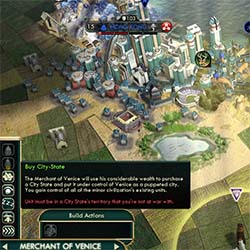
Venice cannot purchase City-States that it is at war with.
If there are any City-States that you cannot attain or maintain alliances with, then consider simply buying them with a Merchant of Venice. Make sure that you aren't at war with the City-State though, since you can't purchase City-States that you are at war with.
Pursuing a religious path can be very helpful in a diplomatic victory, as you can use your faith to buy Merchants of Venice once you finish Commerce. Adding a steady stream of faith-bought Merchants will ensure that nobody can unseat you as the master of City-State alliances!
On harder difficulties, it is impossible to get the A.I.s to vote for you as world leader unless you resurrect them from having been eliminated. You'll need the extra delegates from Globalization or from being the leading candidate in several elections in order to get yourself over the edge.
The best army money can buy: Domination victory with Venice
Venice is also well-suited to a domination victory primarily due to its excessive wealth, which will allow it to buy a formidable army and bribe other civs into wars.
A risky tactic could be to avoid building a standing army and wait for an aggressive neighbor to attack you thinking that you are easy pickings. Then start buying units in your cities to repel the invasion and bribe other civs into declaring war on your opponent. Having allies will greatly reduce any warmonger penalties that you would otherwise accumulate from conquest. But this isn't necessary, since the income from your extra trade routes should allow you to afford a large standing army at all times. You will need to add a few puppets into your empire so that you don't hit the unit cap!
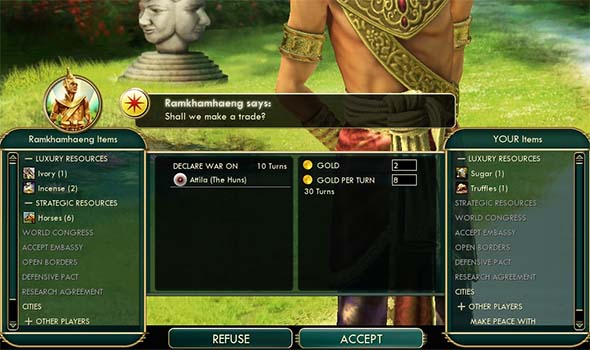
Venice can use its excessive wealth to play other civilizations against each other and create alliances.
Make sure you build or buy Barracks in Venice and construct the Heroic Epic early so that your units will have the Morale promotion.
Commerce is a great policy tree to adopt regardless of your victory condition, and Mercenary Army should be an early priority if you plan on playing aggressively. Landsknechts are relatively cheap, and their bonuses towards pillaging will offset their cost and the cost of their upgrades. Depending on the map, your Great Galleass can make excellent defensive units or supports for amphibious invasions of nearby civs. If you built the Great Lighthouse earlier in the game, then the Great Galleass will be a little bit more useful since you can actually mobilize them as quickly as Triremes.
You should use your Merchants of Venice to perform trade missions in cultural, militaristic and mercantile City-States in order to maintain them as allies. This will provide you with culture for new social policies, excess strategic resources, a steady stream of new units, and plenty of happiness to support your conquests. Maritime and religious City-States should then be the primary fodder for puppeting using Merchants of Venice. You gain all the units that a City-State controls when you buy it with a Merchant of Venice, so if you find a City-State with a particularly strong military (or a particularly advanced military), then you can significantly sharpen your stick at the drop of a hat!
The spaceship of freedom: Science victory with Venice
There are several factors weighing against Venice when it comes to a science victory:
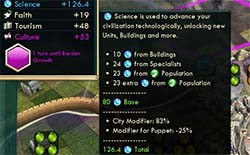
Puppets have a -25% science penalty.
- Venice cannot found its own cities, so it can't place cities next to science-generating natural wonders, university-buffed jungles, or Observatory-enabling mountains.
- Venice is limited in how much raw research it can produce due to having fewer cities.
- Venice's puppet cities generate 25% less science than native cities.
- All space ship parts must be built in the Capital.
On the upside, however, having fewer cities means that Venice will not suffer from as much tech cost inflation, and having double trade routes means you can send more routes to the tech leaders in order to leech off some of their scientific progress. Also, the National College and Oxford University will be cheap and easy to build.
Focus on sending food and production to newly-acquired puppets so that they can work all their useful tiles and start assigning specialists. Puppets will work any academies that you plop, but you'd be much better off placing all academies near your Capital to avoid the -25% science penalty in puppets. Buy any City-States that are near science-generating natural wonders to keep them out of the hands of your rivals.
You can also consider using your classical and medieval social policies to open Patronage and adopt the Scholasticism policy, but it's probably better to go down Commerce. Puppets will focus on gold-generating buildings, so you will surely have Markets and Banks in your puppets, which means you'll get a benefit from Mercantilism (which is helpful for Venice regardless).
Adopt Rationalism and Scientific Revolution as soon as you can so that you can start using your wealth to purchase Research Agreements with all civs who are willing. You can even afford to pay extra gold if you need to. If you're behind in technology, then passing Scholars in Residence in the World Congress will also help you to catch up. Adopting Free Thought allows you to replace any non-irrigated farms in your puppets with Trade Posts so you can get gold and research.
When you get to the Modern Era, you'll likely have to decide between Order and Freedom. Order does have a few good science tenets in its second tier (Party Leadership and Worker's Faculties), but these are only helpful if you conquered a lot of enemy cities or bought a lot of City-State puppets. Order's Space Pioneers tenet (Great Engineers can rush spaceship parts) will be helpful but only moderately reliable. Venice should be able to buy Great Engineers with faith if they've finished Tradition, but it will take a long time to accumulate enough faith and engineer points to generate multiple engineers.
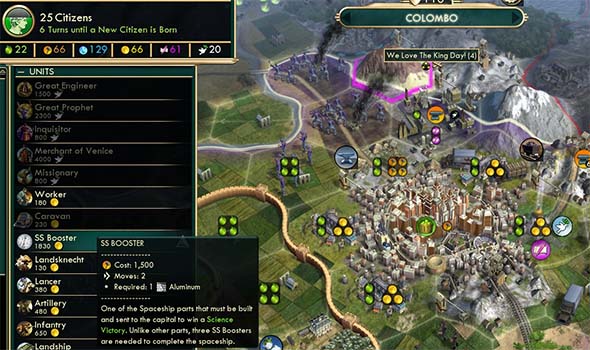
Freedom's "Space Procurement" tenet allows Venice to buy spaceship parts (even in its puppets).
Freedom is likely a better option for Venice. If you are the first to get to Freedom, then you should chose Civil Society (specialists consume half food) and Avant Garde (+25% Great Person generation) as your first two tenets. These will help your cities to grow faster (so they generate more science and can support more specialists) and allow you to generate more Great Scientists, which you can use to power through the late-game tech tree.
The tenet that you are gunning for is Space Procurement (can purchase spaceship parts with gold)! This will allow you to use your surplus of gold to buy spaceship parts (even in puppets) and avoid having to wait to build them one at a time in your capital. This tenet can make the difference between winning and losing if you have to face off against another science-focused civ like Korea, Babylon, or Iroquois (Hiawatha is always competitive for science victory). You can wait till you finish Rationalism before adopting Spaceship Procurement, since you likely won't be far enough into the tech tree to be building spaceship parts until later in the game anyway.
A little Carmen Sandiego: Cultural victory with Venice
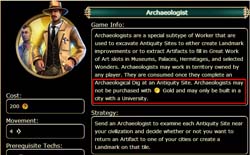
Not even Venice can buy Archaeologists.
Cultural victory is probably the most challenging path for Venice. The biggest hindrance to this victory is that Archaeologists cannot be purchased with gold. Since Venice can't control the build queue of its puppets, it is forced to train all of its Archaeologists in its Capital! Try to get all your trade unit and wonder construction out of the way before you research Archaeology so that you can dedicate your Capital to popping out a constant stream of Archaeologists. In addition, Venice may not have as many cities as other civs and so may not have as many slots for great works.
On archipelago maps, Cultural victory can be made a bit easier if Venice focuses on the Exploration policy tree. Since you'll have mostly sea-based trade routes, Exploration's Cargo Ship buffs are much more advantageous than Commerce's Caravan buffs (although Mercantalism is still worthwhile). Also, this tree will help make your Great Galleass much more useful. Finishing Exploration early can give you priority access to hidden antiquity sites.
If you followed a religious strategy, and were able to obtain one or more of the religious buildings (Cathedrals are the best for a culture victory), then you may want to adopt the Sacred Sites reformation belief. If a neighbor also has a religion with a building, then you can use your trade routes to spread their religion into one of your cities. Once they have a foreign majority in one of your cities, you can spend your faith to buy missionaries of that religion in your city in order to spread the religion into your own cities and build the special building. Once that is done, you can use a Great Prophet or inquisitors to convert your cities back! Cathedrals and Sacred Sites would definitely help to make up for any weaknesses that Venice may have towards winning a culture game.
Even if you don't found your own religion (and thus could avoid the Piety tree), you can still keep an eye out for which civ adopts a religion with Cathedrals. Use your trade routes to spread that religion into your cities and buy the Cathedral. This will free up your social policies to go into the Aesthetics and Commerce policy trees.
If you are lacking enough great work slots and find yourself being overwhelmed by other civs that have more tourism, you can purchase a large army and/or navy and use it to conquer that civ's most culturally-significant city(ies). Since it might be difficult to keep up technologically, you will likely find yourself losing out on many of the mid and late-game tourism wonders. Capturing cities containing culture wonders may be your best shot at obtaining such wonders.
Not having to build settlers early in the game does free up Venice to try to go for the Great Library at medium difficulty levels. If one of your first few ancient ruins happens to give you the Pottery and/or Writing tech, then you can even compete for the Great Library at higher difficulties, but it will still be tough to build if you lack good production in your Capital.
Putting the blinders on Enrico: countering Venice
Depending on which civ you play, Venice can be the biggest pain in the butt in the game. If you are a civ that has perks towards City-States, then you should prioritize killing Venice as early as possible. Venice can eat up City-States, which can completely neutralize the traits of Greece, Siam, Austria, Mongolia, Morocco, and Portugal. Venice is even more troublesome than Austria, since Venice does not require an alliance in order to use its Merchant of Venice to buy the City-State. The only way to prevent them from using this power would be to block the Merchants of Venice from even entering City-State territory. Good luck with that...
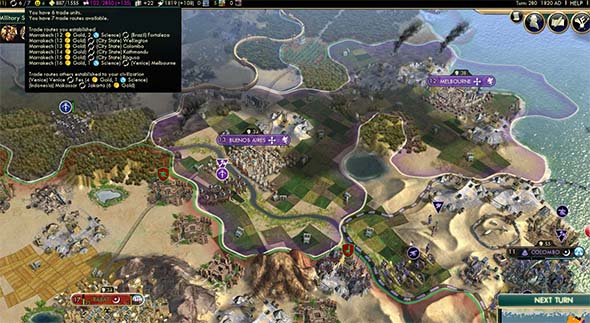
Venice (along with Austria) can easily frustrate civs that benefit from City-States, such as Greece, Siam, Austria,
Portugal,
Morocco, and Mongolia.
Venice's purchased City-States do not count as occupied cities, and are no longer considered "capitals". This means that they cannot be liberated, and they can be razed! When Venice purchases a City-State, the number of votes to win diplomatic victory is also reduced. Be aware of this in case Venice starts buying the City-States that it isn't allied with. If they had the lead in several failed votes in a row or have teched to Globalization, then they may be able to reduce the threshold for diplomatic victory to something that they can win.
Enrico's A.I. also really loves religion. You can expect Venice to found a religion fairly early if they are present in the game, so there's always the risk that they will beat you to your preferred beliefs. If you're lucky, they may send trade routes your way so that you can utilize Religious Tolerance to gain some of the benefits of their religion.
Enrico's excessive number of trade routes can be a huge boon in some circumstances. Making money can be very difficult early in the game, but if you are next to Venice, then you can probably expect to see multiple trade routes coming your way. Venice is also always a great civ to unload your excess luxuries and strategic resources upon. Enrico will almost always have positive gold per turn and limited territory, which means he is almost always interested in trading for resources.
Enrico is also likely to fall behind technologically due to the -25% research in puppet cities. This means he's a great target for Research Agreements, since he can almost always afford them and he's rarely a threat for a scientific victory.
If you are trying to play for a domination game, then be sure to strike Venice swiftly and with little-to-no warning (especially a human-controlled Venice). Venice's overflowing coffers can allow it to very quickly buy a defensive force, which can make prolonged wars difficult. Position your military to begin sacking its Capital immediately, and be sure to place units along its trade route paths so that you'll automatically plunder their routes as they cross over your units. You can potentially make hundreds or thousands of gold by plundering Venice's trade routes and pillaging his improvements!
As mentioned before, if Venice's Capital has been captured, their Capital shifts to one of their puppets, but they are still not allowed to annex that city. In addition, if Venice recaptured its original Capital by force, it also becomes a puppet! This is crippling, since it deletes all of Venice's national wonders, prevents Venice from even competing for world wonders, and completely eliminates them from being able to build Archaeologists or spaceship parts (unless they adopted Freedom's "Space Procurement" tenet). At this point, Venice is reduced to little more than a coalition of City-States, and you don't really need to worry about them for the rest of the game as long as they don't start buying an army.
However, if Venice buys their Capital back from its conqueror during the other player's turn, then it will be annexed. Further complicating matters, if Venice is given a city through a trade deal (on another player's turn), it may be annexed by a variation of the auto-annex bug! Be wary of buying and selling cities to Venice.
Discuss this strategy on Civfanatics:
http://forums.civfanatics.com/showthread.php?
p=13223974#post13223974
or on the official 2K Civilization V forums:
http://forums.2k.com/showthread.php?
513361-A-general-strategy-for-Venice&p=6028091#post6028091
Listen to the discussion on PolyCast, Episode 203, 42m02s (June 21, 2014):
http://civcomm.civfanatics.com/polycast/polycast/season8/episode203.mp3